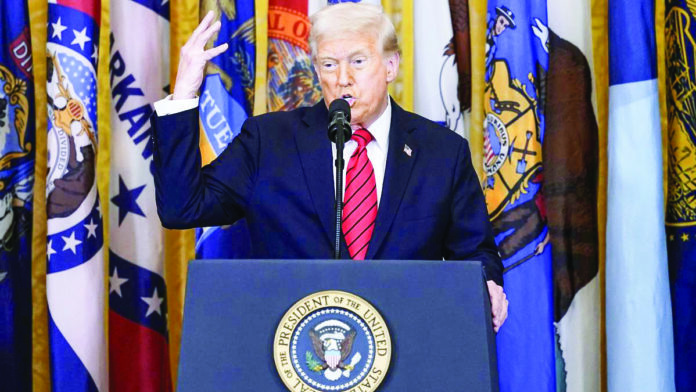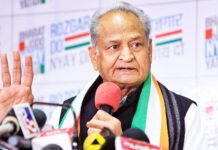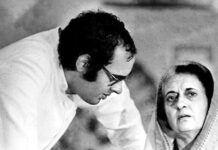Analysts believe that the US-India relationship will continue to grow regardless of what President Trump does next, however, PM Modi will have to navigate the rest of the Trump years deftly.
TRUMP’S ‘MEDIATION’ CLAIMS
CHICAGO: When US President Donald Trump announced in his social media (Truth Social) post that India and Pakistan had agreed to a “FULL AND IMMEDIATE CEASEFIRE (sic),” many around the world heaved a sigh of relief. In his subsequent social media posts and public comments over the next few days, Mr Trump gave the impression that the United States of America brokered the ceasefire between India and the Islamic Republic of Pakistan with his cabinet’s direct involvement. He even bragged about how he dangled the carrot of trade deals to stop the fresh round of fighting, a possible nuclear escalation, in the Indian subcontinent.
The announcement made a huge splash in the world media. The mere thought of averting a nuclear war was a relief. However, a profound sense of disbelief and betrayal shrouded India. Your Chicago Diary columnist talked to many people in India—from private citizens to public figures, bureaucrats, and public intellectuals—who were appalled at Mr Trump’s seemingly moral equivalence between India and the Islamic Republic.
Mr Trump’s rhetoric implied parity between India and Pakistan, ignoring Pakistan’s documented support for terrorism, which the US has previously condemned. Indians argue this oversimplification distorts the conflict’s root causes and risks legitimizing Pakistan’s narrative, which India opposes. India has been the victim of Islamic terror for decades, and many may argue that this conflict has a thousand-year history, as repeatedly claimed by Mr Trump. Pakistan, most recently, was also the perpetrator of the ghastly April 22 terrorist attack in Pahalgam, India, that saw over two dozen Hindu tourists murdered in cold blood.
THE OUTRAGE
Mr Trump’s public statements sent shockwaves through India’s diplomatic circles. “Mediation on Kashmir is a red line for Indian diplomacy, and Trump should have avoided this,” said Amitabh Singh in a text message. Singh is an associate professor in Jawaharlal Nehru University’s School of International Studies. Singh continued, saying that the public opinion in India has soured against Mr Trump and the US. Any talk of India accepting a “ceasefire” under pressure from the US for a trade deal does not hold water, as India had already achieved its strategic goals of severely damaging Pakistani terrorist infrastructure and defence installations.
India summarily rejected Mr Trump’s mediation claim. India has consistently maintained that Jammu and Kashmir is a bilateral issue, as outlined in the Shimla Agreement (1972) and Lahore Declaration (1999). Trump’s claims contradict India’s sovereign stance against external involvement. Opposition leader Shashi Tharoor also rubbished Mr Trump’s claim of brokering a ceasefire deal and stopping a potential nuclear war. Appearing on the David Frum Show, Tharoor explained how Mr Trump might have embellished his mediation claims.
How should one interpret Mr Trump’s perplexing statements on the India-Pakistan conflict? Politicians, diplomats, and analysts in India are grappling to understand Mr Trump’s remarks. They have been left scratching their heads, adding to the uncertainty in US-India relations.
Though India is not a treaty ally of the US, every US President since George W. Bush has bettered the relationship with India, including Mr Trump in his first term. The bilateral trust deficit, however, still exists. As Rich Varma, the former US Ambassador to India and a Deputy Secretary of State in the Biden administration, wrote in his doctoral dissertation (2020): “The United States does not count India as one of its closest friends and partners, and few would assert that we have become allies, natural or otherwise.” The deficit was evident most recently during the Russia-Ukraine war. Despite the improved relationship, India refused to join the US-led sanctions regime against Russia. In retaliation, some claimed, the US imposed the collective punishment of visa denial on Indians. Indians also accuse the Americans, through international grants (USAID), etc., of undermining democracy and creating social unrest, as well as pushing a regressive woke ideological agenda in India. Tariffs were an issue even in Trump’s first term.
SERIOUSLY, BUT NOT LITERALLY
It is well-known that President Trump is transactional. People also say one should take Mr Trump seriously, but not literally. “Trump tends to adlib,” said Subhash Kak, a computer scientist at Oklahoma State University and a member of Prime Minister Modi’s Science, Technology, and Innovation Advisory Council. Communicating via email, Kak downplayed Mr Trump’s statements on Kashmir. He said Trump’s statement should be “ignored or twisted to imply how India wishes to interpret it.” Kak gave an example of how Russian President Vladimir Putin has dealt with Trump’s pronouncements and demands for a ceasefire in Ukraine. Media reports suggest that Putin has even stepped up military attacks on Ukraine since Mr Trump’s call for a truce in the Russo-Ukrainian conflict. While Ukrainian President Volodymyr Zelenskyy received a public dressing down on this issue in the White House, President Trump has almost been begging Mr Putin for a ceasefire.
NEW WORLD ORDER AND TRUMP DOCTRINE
As much as Mr Trump is transactional, he is not ideological. He is a disruptor, and in his second term, he has turned the world topsy-turvy with his America First agenda. He is rewriting a new world order on the strength of his electoral victory, a trifecta of the House, the Senate, and the White House, in the 2024 elections. The man is in a hurry to implement his election promises to Make America Great Again (MAGA). He has rolled back almost all of his predecessor’s woke policies in DEI (Diversity, Equity, and Inclusion), climate, transgenderism, etc.
Amid talks of tariffs and acquisition of Greenland, taunts of a 51st state for Canada, and embraces of ex-jihadists and authoritarians in the Middle East, the most remarkable aspect of Trump 2.0 is the retreat from Europe. Europe has been one of the closest US allies for nearly 80 years. But European democracies and the Trump administration do not see eye-to-eye on many issues. Within weeks of taking office, US Vice President J.D. Vance delivered a tongue-lashing to the European nations in his speech at the Munich Security Conference. Such scorn is usually saved for authoritarian enemy countries, not democratic treaty allies. Mr Vance attacked them for retreating from their core values of free speech and democracy, and on their policy of unchecked migration. The Trump administration also believes the Europeans live lavish lives because American tax dollars underwrite their security guarantee.
In his second term, Mr Trump advocates a foreign policy grounded in pragmatic commercial ties and negotiations for peace and stability. He prioritizes good relations with the US over the type of government other nations have, seeking deals even with adversaries. He believes shared economic interests can bridge ideological divides. Unlike his “nation-building” predecessors, he shows little concern for promoting American values like liberty or democracy, and woke virtue signalling.
LONGING FOR A LEGACY
Like most Presidents in their second term, Mr Trump also seems deeply concerned about leaving an enduring legacy that will be remembered in history, says Anang Mittal, communicating via email. For Ronald Reagan, that legacy was ending the Cold War. For Bill Clinton, it was giving the Democrat Party a second term after decades. And for George W. Bush, it was the PEPFAR program. “At the end of his first term, Donald Trump began the Abraham Accords, where countries in the Middle East began to recognize Israel. In his second term, President Trump seeks to make peace his international legacy and keep America out of foreign wars his domestic legacy,” said Mittal. Mr Trump sees an opening in the Middle East with the Arab States, and maybe Iran. Mittal thinks Iran will be a repeat of Mr Trump’s engagement with North Korea. Mittal is a GOP communications strategist who has worked for House Speaker Mike Johnson and former Senate Majority Leader Mitch McConnell.
Mr Trump’s desire to be a Nobel Laureate and a peacemaker in the Indian subcontinent must be seen in this context. “All that is to say,” said Mittal, “is that President Trump views his second term role as that of a global peacemaker, and he made those comments about India and Pakistan in that context.”
Mr Trump may have made a miscalculation when he put India and Pakistan on the same pedestal. As history tells us, neither the Pakistani military nor the mullahs are interested in peace, stability, and prosperity in their nation. They are interested in the medieval ideology of jihad and Ghazwa-i-Hind. But India also needs to see Mr Trump’s public statements in the light of the new reality and in the backdrop of a new world order Mr Trump is forging.
Singh, Kak, and Mittal believe that the US-India relationship will continue to grow regardless of what Mr Trump does next. Mittal cautions, however, that PM Modi will have to navigate the rest of the Trump years deftly as President Trump pivots to domestic politics in 2026, hoping to retain the House and the Senate in the midterms. PM Modi has a good relationship with President Trump. While one is an astute grassroots politician, the other is a consummate businessman. They are also populist nationalists.
One potential fallout of Mr Trump’s mediation claim could be cessation of future havans and pujas for President Trump in India. PM Modi’s standing vis-à-vis Trump would depend on the outcome of the tariff deal with the US. Your humble Chicago Diary columnist sees MEGA (MAGA+MIGA) as an eventuality, regardless of who is in the office, either in the US or in India.
* Avatans Kumar is a Chicago-based award-winning columnist.








